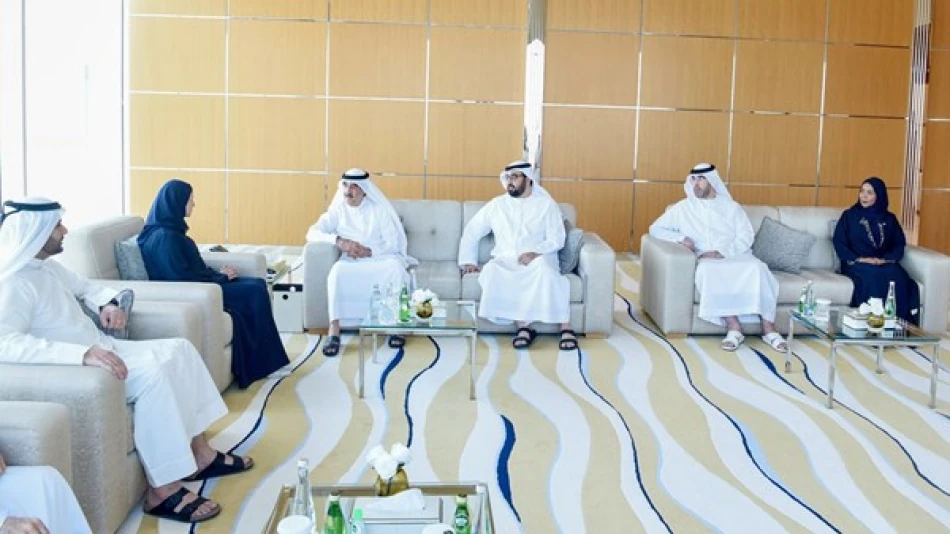
Ruler of Umm Al Quwain Hosts Education Minister for Talks on Advancing Educational Initiatives
UAE's Umm Al Quwain Reinforces Education Focus as 2025-26 Academic Year Begins
As the UAE prepares for another academic year, Umm Al Quwain's leadership has doubled down on education as a cornerstone of national development, signaling the emirate's commitment to building a knowledge-based economy. The high-level meeting between the emirate's ruler and the federal education minister underscores how local governance continues to play a pivotal role in executing the UAE's broader Vision 2071 strategy.
Leadership Alignment on Educational Excellence
His Highness Sheikh Saud bin Rashid Al Mualla, Supreme Council Member and Ruler of Umm Al Quwain, received Minister of Education Sarah bint Yousef Al Amiri at the Emiri Court to discuss preparations for the 2025-26 academic year. The meeting, attended by Crown Prince Sheikh Rashid bin Saud bin Rashid Al Mualla and Deputy Ruler Sheikh Ahmed bin Saud bin Rashid Al Mualla, demonstrates the emirate's institutional commitment to educational advancement.
During the briefing, Minister Al Amiri outlined the ministry's latest developments and strategic initiatives for the new academic year, reflecting the UAE's systematic approach to educational reform that has positioned the country as a regional leader in human capital development.
Strategic Investment in Human Capital
Sheikh Saud emphasized that the UAE's leadership places special importance on education at all levels, viewing it as fundamental to creating qualified professionals capable of addressing future challenges. This approach aligns with the UAE's broader economic diversification strategy, which relies heavily on developing a skilled workforce to support sectors beyond oil and gas.
The ruler's focus on "enhancing the quality of educational outcomes" reflects lessons learned from global education leaders like Singapore and Finland, where consistent investment in teacher training and curriculum development has yielded measurable improvements in student performance and economic competitiveness.
Institutional Collaboration Model
The meeting highlights the UAE's unique federal structure, where individual emirates maintain significant autonomy while coordinating with federal ministries on national priorities. This model has proven particularly effective in education, allowing for localized implementation of federal standards while maintaining consistency across the seven emirates.
Sheikh Saud praised the Ministry of Education's efforts in developing educational processes and acknowledged the central role of teachers and administrative staff in ensuring academic success. This recognition comes as the UAE continues to attract international educators and implement advanced teaching methodologies to compete with global education hubs.
Market Implications and Regional Context
The UAE's sustained investment in education carries significant implications for regional competitiveness and economic development. As neighboring countries grapple with youth unemployment and skills mismatches, the UAE's proactive approach to human capital development positions it favorably for attracting international businesses seeking skilled workforces.
Minister Al Amiri's appreciation for the emirate's "continuous support for educational institutions" and commitment to creating optimal environments for students and teachers reflects the tangible benefits of coordinated governance. This institutional alignment has historically translated into higher education rankings and increased foreign direct investment in knowledge-based sectors.
Long-term Vision Execution
The emphasis on preparing students to contribute to the nation's development and renaissance journey directly supports the UAE's Vision 2071 goal of becoming the world's best country by the centennial of its founding. This requires not just educational excellence, but also the cultivation of innovation, critical thinking, and entrepreneurship among young Emiratis.
As regional competitors like Saudi Arabia and Qatar similarly invest heavily in education through their respective Vision 2030 and National Vision 2030 programs, the UAE's consistent focus on quality over quantity in educational development may prove decisive in maintaining its regional leadership position in human development indices.
Most Viewed News

 Layla Al Mansoori
Layla Al Mansoori






